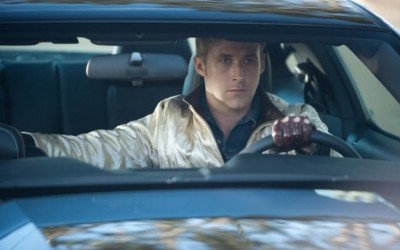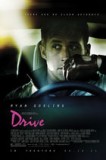| Reviews & Columns |
|
Reviews DVD TV on DVD Blu-ray 4K UHD International DVDs In Theaters Reviews by Studio Video Games Features Collector Series DVDs Easter Egg Database Interviews DVD Talk Radio Feature Articles Columns Anime Talk DVD Savant Horror DVDs The M.O.D. Squad Art House HD Talk Silent DVD
|
DVD Talk Forum |
|
|
| Resources |
|
DVD Price Search Customer Service #'s RCE Info Links |
|
Columns
|
|
|
Drive

Watching Ryan Gosling has become one of the more compelling activities for discerning moviegoers over the last few years--not in "keep an eye on this guy, he's doing interesting things" kind of way, but in the literal act of watching him, and specifically him, in the films that he does. You can't take your eyes off of him. It's easy to click off the roll call of intense and iconic actors who he recalls (Brando, Pacino, Penn, Depp) without examining why he brings them to mind: because he possess that intangible, elusive quality--call it magnetism, charisma, heat, whatever--that draws us in.
Nicolas Winding Refn, the director of Gosling's new film Drive, is well aware of that quality, and uses it--plays up to it, even. His character is, in the early scenes, purposefully opaque; Refn and screenwriter Hossein Amini (adapting James Sallis's book) construct those opening passages in a way that painstakingly minimizes the amount of dialogue he speaks, sometimes reducing scenes down to mere in and out points, skipping the chitter-chatter in between. (It also makes his quiet work here an even more jarring contrast to his chatty ladies' man in last month's Crazy, Stupid, Love.)The pacing is deliberate, lackadaisical even. Long takes hold on Gosling's face as he takes in his surroundings, contemplates a situation, and reacts. Or doesn't, whichever.
By regarding his lead actor in such a way, Refn makes us key in him even more keenly than we otherwise might--we're paying precise attention to him, searching out his face for clues, hints, indications. Sometimes we get them, sometimes we do not, but we do get more of them as the picture progresses, and this strong silent type slowly finds himself in a situation that he is not equipped to handle. There is a wonderful moment, moving into the third act, when he is pointedly asked, "What are you gonna do?" He does not answer, but the following shot finds him sitting at a stoplight, putting his face to his hands, and the desperation of the movement and the expression it hides tells us all we need to know. The way this startlingly talented young actor opens up the character--and the film--is astonishing.
Danish director Refn's big American break was 2008's Bronson, a stylistically impressive picture that was badly crippled by its own relentless, one-note monotony. Reviewing it in 2010, I wrote, "It's clear that Refn has the gift of cinematic flash, and that (star Tom) Hardy is a compelling screen presence. But it's like a demo reel for the both of them. I'm looking forward to seeing what happens when they make a real movie." Hardy made Inception; now Refn has made Drive, and it is a real movie indeed--a dark, brutal, wildly unpredictable slab of nihilistic cinema that is filled with homages and echoes yet is its own fierce, savage beast.
Dwelling in a slick, glossy L.A. that recalls the films of Michael Mann, Drive's unnamed protagonist (Gosling) works as a movie stunt driver (he wears a silver jacket reminiscent of Kurt Russell's "Stunt Man Mike" in Death Proof), supplementing that income by working in the garage of his supervisor (Bryan Cranston). And then he supplements that with occasional gigs as a getaway driver. The film opens with one of those jobs, an exhilarating sequence of enigmatic dialogue, tense but stylish music, and dead-cool photography. As he evades police cruisers and a chopper, Gosling doesn't twitch, doesn't blink, and doesn't sweat. He's just doing what he does; when a cute neighbor (Carey Mulligan) asks what he does, his reply is succinct, but accurate: "I drive."
This is not a guy who is easily shaken; later, when he is approached at a diner by a former client, he loses his temper yet doesn't lose his cool. But clearly something about that woman down the hall gets to him; he likes her, and he likes her young son, and if he's upset when her husband (and the child's father), the improbably named Standard Gabriel (Oscar Isaac) gets out of jail and returns home, he doesn't show it. When he gets worried is when one of Standard's old debts puts the wife and kid in danger; against his better judgment, the driver offers up his services on a robbery that will get Standard out of debt. No surprises for guessing how well that goes.
As mentioned, the shout-outs to other films are plentiful, from specific moments and scenes (the camera ratchets up the tension by staying in the car with Gosling during the robbery rather than going inside, a la Gun Crazy; a harrowing car chase with no musical accompaniment recalls Bullitt) to the overall vibe, which approximates a mid-80s Cannon revenge thriller as lensed by Antonioni. The latter influence is apparent in the artsy framings and patient rhythm of the first half, the former in the synthy music (Cliff Martinez has composed the best new score of 1986, and I mean that is a compliment) and title design--and in the blunt violence of the second half, which is so brutal and so graphic that it is a little stunning. The picture has been so restrained and muted up to that point that it catches us unawares; subsequent bloodshed is equally extreme, so weak stomachs should consider themselves warned.
Though Drive is indisputably Gosling's show, the supporting cast is almost entirely terrific. The sole exception is Ron Perlman, who is irritatingly over the top (and Christina Hendricks, who isn't bad as much as she is wasted in a role with maybe a dozen lines). But Gosling is nearly as well-matched with Mulligan as he was with Michelle Williams in Blue Valentine or with Emma Stone in Crazy, Stupid; he feeds off the naturalism of his co-stars, and they make each other better. Isaac is a bit of a live wire; he has a wonderfully elusive quality that puts all of his scenes up for grabs. Cranston brings a lived-in, grizzled realism to his somewhat pat role, and while the casting of Albert Brooks as a hard-boiled gangster type is (at face value) peculiar, he somehow pulls it off, harnessing his groggy weariness (that raspy voice has seldom been so well-utilized) and that impatient anger that's always percolating under his best work. He's unexpectedly chilling and effective.
With its wild tonal shifts and blood-spattered back half, Drive dances right up to the edge of parody, but miraculously doesn't cross it. Some audiences (and certainly some critics) will loathe it. But at the end of a long summer of B-level superheroes and 3-D Transformers, its twisted energy and what-the-fuck brilliance is refreshing indeed.
Jason lives in New York. He holds an MA in Cultural Reporting and Criticism from NYU.
|
| Popular Reviews |
| Sponsored Links |
|
|
| Sponsored Links |
|
|
| Release List | Reviews | Shop | Newsletter | Forum | DVD Giveaways | Blu-Ray | Advertise |
|
Copyright 2024 DVDTalk.com All Rights Reserved. Legal Info, Privacy Policy, Terms of Use,
Manage Preferences,
Your Privacy Choices | |||||||










